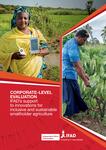Page Header
IFAD's Engagement in Pro-poor Value Chain Development
Overview
The attention to value chain development is becoming increasingly important for IFAD as traditional food systems are being replaced by organized value chains. Over the last decade, the number of value chain- relevant projects supported by IFAD has increased from 41.5 per cent to 72.3 per cent, while the volume of loans approved has gone from 50 per cent to 81 per cent. This major shift posed challenges as the value chain approach was new to many IFAD staff and government staff in charge of managing IFAD-funded projects. The evaluation found that project design has improved over time, reflecting a better understanding of the value chain concept. However, analytical gaps remain. Few designs have been supported by market intelligence to prioritize the choice of commodities and steps within the value chain in order to achieve pro-poor outcomes. The evaluation suggests that it is possible to reach out to poor and very poor producers through value chain approaches, but this requires specific attention. The most convincing pro-poor outcomes occurred in projects where IFAD had experience and where multi-stakeholder platforms were created to enable dialogue between value chain actors. The evaluation recommends that a corporate strategy be prepared for IFAD’s support to pro-poor value chain development that clarifies the objectives and principles of engagement as well as the resources required. It suggests a “programmatic” approach to value chain development, recognizing the need for long-term engagement. Finally, the evaluation emphasizes the importance of promoting an inclusive value chain governance and regulatory environment.Report Details
| Year Published | |
| Type | |
| Joint | No |
| Partner/s | N/A |
| Consultant name | |
| Agency Focal Point | Fabrizio Felloni |
| Focal Point Email | f.felloni@ifad.org |
| Managed by Independent Evaluation Office | Yes |
YOU 'RE READING
IFAD's Engagement in Pro-poor Value Chain Development







